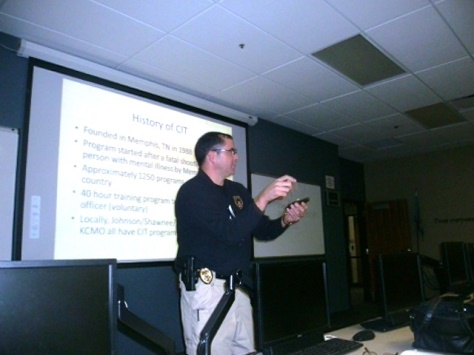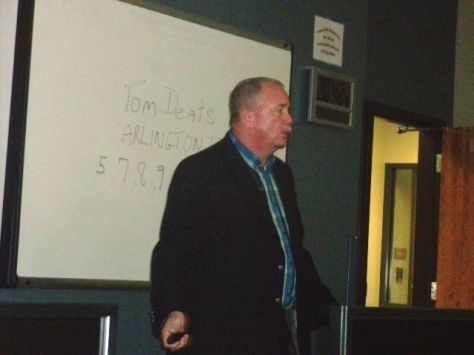by Mary Rupert
A challenge to the Unified Government’s leaving a commission seat unfilled for more than a year was heard in court today.
A human rights activist, Alvin Sykes, said both sides presented reasons for summary judgment, and the court took the case under advisement. Currently, an effort also is underway from a state legislator, Sen. David Haley, to change the law on filling vacancies.
In the lawsuit in Wyandotte County District Court, a resident challenged the local government, saying that the commission’s 1st District, at large, seat should have been filled. The seat was left unfilled after a majority of six votes could not be reached for either of two finalist candidates for the appointment. In a court filing, the UG had argued that filling the vacancy was “discretionary.”
The issue was reopened this past summer, and on Aug. 7 the mayor proposed to reopen the voting and leave out the top two vote-getters, and have the commission vote on the remaining candidates. The commission voted 5-4 in favor of the mayor’s idea, with six votes needed to pass. At the time the mayor said that it would be the last time it came up before the next election.
“In response to the at-large situation, the mayor brought it up twice, to a vote twice, and it was voted down twice,” said spokesman Bill Hurrelbrink of Mayor Mark Holland’s office. “The mayor is fully supportive of filling the at-large position, but the times he brought it up, it’s been voted down. The mayor supports filling that position.”
For some of the comments of commissioners in August, visit this earlier story, https://wyandotteonline.com/ug-deadlocks-again-on-filling-vacant-1st-district-seat-at-large/.
Regardless of the outcome of the lawsuit, Sykes said an effort is being made to introduce legislation next year that would prevent an unfilled seat from happening again.
“It is and continues to be my deepest belief that the people of Wyandotte County have been shortchanged,” said Sen. Haley, D-4th Dist.
He said that in a democracy, every elected office should not remain vacant for a long period of time. He added that researchers have not found any other elected position that has remained vacant in Kansas longer than 42 days. That instance was when someone died in office and the government waited a period of time out of respect to the widow, he said.
Sen. Haley said he has had a bill drafted and asked for comments on what should be a reasonable amount of time a position should be vacant. His draft bill lists 30 days, but that is subject to change, he said.
The UG’s charter, while it says that a person shall be appointed to fill a vacancy on the commission, does not give a length of time in which the position must be filled. Also, it does not state how a tie will be broken.
Sen. Haley’s draft bill states: “The purpose of this section is to provide an orderly and prompt means of filling vacancies in the governing body of a municipality. Prolonged vacancies in the governing body of a municipality deprive citizens of their right to representation and act as impediments to the orderly function of government of municipalities.”
Under this draft bill, if a position in the municipal governing board is not filled within 30 days, then it would be filled by a random drawing by the city clerk of a name of one of the applicants for the position.
Sen. Haley said it is “galling” to hear the anguish of people not being represented against the backdrop of some of the commission’s suggestion that an at-large district doesn’t really need to be represented or that the district is well-represented without a commissioner.
Sen. Haley said he is open to comments from other people about changes that can be made in the draft bill.
While he is hoping other legislators support the bill, even if the rest of the legislative delegation does not back this effort, Sen. Haley said he still plans to introduce it.
“If I’m alone in my thinking, it’s still the right thing to do,” he said.
Haley, who twice was the Democratic nominee for secretary of state, the highest election official in Kansas, said he has a strong belief that it matters if the people are represented.
He said he would like to make sure that as many different people as possible are heard.
“We don’t want to consolidate into the hands of one or the hands of a few the ability for representation to be found for the general public,” Sen. Haley said.
After the unfilled commission seat issue is resolved, if there is no change to the UG charter, Sykes said plans are being made to challenge the rotation of districts in the mayoral contest under the Voting Rights Act in U.S. District Court.
Under the rules of the UG’s charter, four commissioners running for mayor have to give up their seats, while the other four who run for mayor can return to their seats for two years. This schedule is not rotated under the current rules, so that, for example, the commissioner from District 1 always has to give up his seat to run for mayor, while the commissioner from District 3 never has to give up his seat to run for mayor.
“By the time we’re through, we will have a change, a far better, equal form of government, and representation for our people in Wyandotte County,” Sykes said.
To see a previous story on this topic, visit https://wyandotteonline.com/lawsuit-will-continue-to-try-to-fill-1st-district-at-large-seat/


